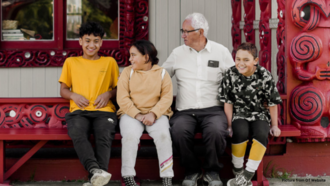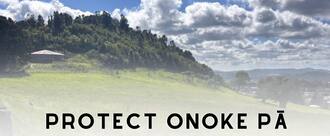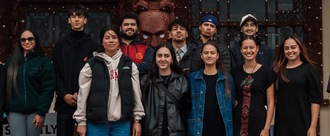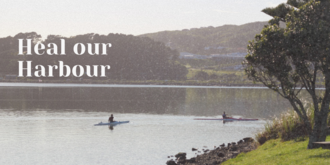-
The Government must apologise to disabled adults, children and their whānauSigned by Awhi Ngā Mātua, IHC, Disabled Persons Assembly NZ Inc, Parent to Parent, Disability Connect, Mental Health Foundation of New Zealand, NZEI Te Riu Roa, Parents of Vision Impaired PVINZ, iFUNZ, NATINA Neuroscience And Trauma Informed Network Aotearoa, ASD Dads NZ, VIPS Equity in Education, Flying Kites, Empower Learning Project, Inclusive Performance Academy, Fragile X New Zealand, NZ Disability Advisory Trust Inc, United Community Action Network (UCAN), Te Aka Tauira - Victoria University of Wellington Students’ Association, Auckland Action Against Poverty, United Community Action Network, Project Gender, ActionStation, The Angelman Network, Fairer Future Collaboration, Aotearoa Liberation League, Little Shadow, Te Kura o Hāpuku, System Change Aotearoa, NZ Disability Advisory Trust Inc., Supporting Diversity, Whakaata Tohu Tohu | Mirror Services, Justice and Peace Commission Catholic Diocese of Auckland, Standards and Monitoring Services, Chrome Collective Charitable Trust, Willow Corner, Kahu Hurihia Durie Family Trust, Barbarian Productions Ltd., Pōneke Anti-Fascist Coalition,Lead Aware NZ, Northern Monthly Meeting, the Auckland and Northland branch of the Religious Society of Friends in Aotearoa/ New Zealand (Quakers) Te Hāhi Tūhauwiri.11,703 of 15,000 SignaturesCreated by Awhi Ngā Mātua
-
Keep Our Māori Wards!Local decision-making is essential to daily life. The way our council is made up and who we elect to represent us, makes a difference. In 2021, local communities pushed for the then-Government to break down discriminatory barriers and make it easier for Māori wards to be established and strengthen local democracy. The changes included removing the requirement for councils to hold binding referendums to establish Māori wards if 5% of local voters petitioned the council. This had become an almost unsurmountable barrier for councils who wanted to set up Māori wards. Since the requirement for referendums for Māori wards was removed, Aotearoa has gone from having just three councils with Māori wards to 49 councils which either have them or will have them by 2025. That's a 1500% increase and covers 58% of local authorities. In other words, communities have shown clear support for Māori wards across the country. Yet last year the Coalition Government reversed this legislation with their Local Government (Electoral Legislation and Māori Wards and Māori Constituencies) Amendment Bill. This change forced local councils to either disestablish their Māori wards, or head to an expensive and distracting referendum in the 2025 local body elections. Two thirds of mayors and council chairs from across the country have said that this Bill is an overreach on local decision-making. The Waitangi Tribunal has found the changes the Government is making in this Bill are a direct breach of Te Tiriti o Waitangi. They also found that whole communities have benefited from Māori wards, and that referendums or polls are likely to have a divisive effect. After the vote, the overwhelming majority of councils voted to keep their Māori ward seats, which means that this year, 42 councils will be forced to run referendums at local body elections. No other ward has to be decided by referendum, and non-Māori hold the majority numbers in most regions which does not create a fair playing field for this decision. Now is the time to say yes to Māori wards. N.B. Māori wards are seats on councils, not hospital wards. References: Read ActionStation’s Protect Māori Wards report here Read the Waitangi Tribunal report here Read the Open Letter from Mayors and Council Chairs here8,408 of 9,000 SignaturesCreated by Team ActionStation
-
Massey University: Divest from GenocideIt has come to our attention that Massey University is complicit in genocide. The Massey University Foundation has $64 million invested in managed funds, of which a spokesperson has confirmed $7,105 has been invested in Israeli Government Bonds over the last three months. Within those three months, the Israeli government has bombed schools, attacked health infrastructure, fired missiles into refugee camps, and prevented aid from reaching Gaza, weaponising famine and disease against the people of Palestine. Even prior to your investment, Israel was already engaged in a programme of genocide. As of 6 June 2024, the World Health Organisation reported over 36,000 Palestinians killed— including more than 13,000 children—with more than 10,000 reported missing under rubble and 83,000 injured. Mass graves have been found outside Palestinian hospitals. Even these statistics are being reported as incomplete. These atrocities follow years of dispossession and systematic apartheid inflicted on the Palestinian people by the state of Israel. As of 2022, the people of Gaza already faced “inadequate access to clean water, sporadic electricity provision and [were] without a proper sewage system. Two thirds of the population lived in poverty.” This level of economic and infrastructural destruction at the hands of Israel meant 80% of the population were forced to depend on international aid to survive. Despite UN Resolution 194’s affirmation of Palestinian refugees’ right to return to their homeland, more than 6 million Palestinians live today in the diaspora, barred from their ancestral home. This Nakba (Catastrophe) has been ongoing for more than 76 years. Palestinians have been systematically slaughtered and expelled from their lands to make room for the expansion of illegal Israeli settlements, resulting in a settler-colonial system of oppression “maintained by Israel with the support of the international community.” This is what your investment condones and supports. Massey University, you are complicit in crimes against Gazans, against Palestinians, and against humanity. We, your students, including Palestinian students, pay you to receive an education we wish to be proud of, and you have used that money to help pay for genocide. As academics and university administrators from Gaza have reported after 8 months of incessant bombing, Palestinian civic infrastructure, schools, hospitals, libraries, museums and cultural centres - built by generations of Palestinians - currently lie in ruins. More than 5,479 students, 261 teachers, and 96 university professors have been killed alongside the destruction of all 12 universities in Gaza. Just as you have been cutting courses and jobs across your three campuses for ‘lack of funds,’ you have also been guilty of funding scholasticide in Gaza. Neither outrage, nor disgust are able to convey the full extent of how we feel. We make our demands on the back of a string of student activism across Aotearoa. On the 23rd of May, students from all three campuses joined university students across the country in the National Students Rally for Palestine. On the 14th of June, Massey University students at the Pukeahu campus painted over the walls of the Fine Arts block in protest of Massey University’s lack of stance against the prevailing genocide, leaving the following words addressed to staff: “The students have been asking. Disclose. Divest. Declare. Massey has refused to take a stance. And the staff have remained silent. Massey has defined their response as ‘appropriate’. There is nothing appropriate about ignoring the incomprehensible suffering of Palestinians.” We note the hypocrisy of your investment in Israeli Government Bonds as a signatory of both the UN Sustainable Development Goals, which commits to “Zero Hunger” and “Peace, Justice and Strong institutions,” and the UN Principles for Responsible Investment, which commits to better aligning investment activities with society’s environmental, social, and corporate governance interests. You have clearly failed to uphold a multitude of obligations: to your students, staff, and alumni, to Gazans and all Palestinians at large, and to Te Tiriti o Waitangi. Are you truly acting as a Te Tiriti-led university as you claim? Aotearoa New Zealand, including its universities, including our university, has a responsibility to protect Indigenous people’s rights to sovereignty and self-determination around the world, under the UN Declaration on the Rights of Indigenous Peoples.This means advocating for Tino Rangatiratanga ki te ao - sovereignty for everybody. Both Palestine and Aotearoa have a shared history of injustice under settler colonialism. You have claimed you uphold Te Tiriti to a “new standard of excellence” in “analysis, practice and implementation initiatives across all areas of the university.” Already, at the national level, via Te Mana Akonga, Māori students across Aotearoa have expressed their complete opposition to the colonial state of Israel’s acts of genocide against tangata taketake in Palestine, unapologetically supporting a vocalised statement from tertiary institutions demanding an immediate and lasting ceasefire. A truly Te Tiriti-led university would join Māori students in recognising that there can be no true justice in Aotearoa without justice for Palestine. Universities hold a significant platform and a large amount of power in our country. When you have such a platform with which to be heard, what you don’t say matters just as much as what you do. As such, rather than having a “right to remain silent,” we believe an institution responsible for teaching, producing, and sharing knowledge actually has a responsibility to speak up. It is, after all, enshrined in the Education Act 1989 that you be “the critic and conscience of society.” It is past time that institutions like Massey University use their privilege, their platform, and voice to help FREE PALESTINE.585 of 600 SignaturesCreated by Massey SJP
-
Join the movement for economic justiceThousands of job losses. Rolling attacks on Te Tiriti o Waitangi. No-cause evictions and selling off public housing. Cuts to our public transport, health and education. It is clear - this government has waged economic war on everyday people in Aotearoa. Their approach isn’t new. Taking from our collective pool to line the pockets of private interests is a tried and true method of moving resources away from our communities and forcing more and more of the basics of life into businesses to be profited from. It puts profits over people, and our living world. For what? We can shift the dial. Through a vision for an Aotearoa that is fair and flourishing, where Te Tiriti o Waitangi is honoured properly, and for an economic system therefore that puts the wellbeing of people and our planet above corporate profit- we can unify, act, and build toward real change. Now is the time to act together. Sign up to the campaign now to find out how to get involved. Mauri ora!534 of 600 SignaturesCreated by Team ActionStation

-
Save Oranga Tamariki’s Te Tiriti commitments (7AA)We all want the laws and practices guiding how we as a country look after children in care to have their best interests at heart. We know feeling connected to their culture and history is essential to children's wellbeing. Section 7AA is the only section of the Oranga Tamariki Act that ensures our tamariki Māori have their best interests protected through state care processes. It allows an ongoing partnership between the Crown and Māori to remedy shortfalls experienced by tamariki and their familial ties through state care processes. The repeal of this section will impact the way Oranga Tamariki interact with our children, straining their whakapapa ties with little to no regard as to the implications. Minister for Children Karen Chhour plans to introduce a bill to take 7AA out of the Oranga Tamariki Act to Parliament in mid-May.[1] Section 7AA is the primary legal mechanism for recognising the Crown's Te Tiriti o Waitangi duties in our child protection system, ensuring: 1) The policies and practices of Oranga Tamariki have the objective of reducing socio-economic and historic disparities by setting measurable standards and outcomes for Māori 2) That the polices, practices and services of Oranga Tamariki have regard to mana Tamati, whakapapa and whanaungatanga 3) Partnerships with hapu, iwi and Māori-led organisations are ongoing and strong to protect our Tamariki 4) Accountability is practised by reporting publicly and annually what the Ministry has done, and the impact of those actions with clear next steps. The recent report from the Waitangi Tribunal sheds light on the deeper implications of such a repeal, emphasising the profound impact it would have on the lives of our tamariki and their whānau.[2] Now is the time for action, for us to come together and defend the rights of our children. Indigenous voices and perspectives must be central to any changes made to legislation affecting their well-being. The absence of meaningful consultation with Māori about the repealing of these sections is deeply concerning and represents a failure to uphold the principles of partnership and participation enshrined in Te Tiriti o Waitangi.[3] Without adequate safeguards and holistic considerations, changes to the Oranga Tamariki Act could inadvertently harm vulnerable children and families, particularly those already disproportionately affected by systemic inequities and socio-economic challenges. By signing this petition, you are standing up for the rights of our tamariki and sending a clear message that their well-being and cultural identity must be protected at all costs. Together, let's ensure that Section 7AA remains intact. Join us in this crucial fight by signing the petition today and spreading the word to your friends, family, and community. Together, we can make a difference and safeguard the future of our children. References [1] https://www.parliament.nz/en/pb/hansard-debates/rhr/combined/HansDeb_20230726_20230726_44 [2] https://www.waitangitribunal.govt.nz/news/tribunal-releases-report-on-oranga-tamariki-section-7aa-urgent-inquiry/ [3]https://www.nzherald.co.nz/nz/government-warned-against-repealing-oranga-tamarikis-treaty-commitments/KXJFQ4PU35CSNIBMQE2O7Q6OJI/ https://www.teaonews.co.nz/2024/04/23/not-a-good-look-legal-expert-on-minister-karen-chhours-oranga-tamariki-act-change/ https://www.rnz.co.nz/news/political/514638/crown-lawyers-attempt-to-block-waitangi-tribunal-summons-to-minister-for-children https://www.nzherald.co.nz/kahu/state-abuse-survivor-urges-against-repealing-oranga-tamariki-treaty-commitments/TG4N2SOFBRDXXMXRYAVKDPCMMA/ https://waateanews.com/2024/04/23/tupua-urlich-dedicated-maori-advocate/1,432 of 2,000 Signatures
-
Say NO to Youth Offender Boot CampsIt's the responsibility of people in government to make informed, thoughtful decisions that have long-term benefits for the future of the country. They should use the best knowledge, information and expertise available to guide their decisions to ensure all people and communities thrive, especially our young people. By proposing to bring back the youth offender boot camps, this Government is not following the best expertise or knowledge. Youth offender boot camps are proven to be ineffective. When they were trialled in 2008, reoffending rates were 85-87% within two years [2]. Despite the evidence that they do not work, this Government is proposing to bring them back. Youth offender boot camps for young people have been proven locally, and internationally to be unsuccessful in preventing young people from reoffending due to their failure to respond to the long term and complex reasons why young people become involved with the justice system in the first place. Youth offender boot camps punish children who have been failed by an unequal society. They disproportionately impact Māori youth and children who have experiences of homelessness, violence, poverty, mental health issues, or disabilities. Aotearoa’s youth offender boot camps of 2008 were shockingly unsuccessful, with reoffending rates of 85-87% within two years [2]. Children and young people need care and community connection. Removing children from their homes and communities, and punishing them without addressing the root causes of harm – such as disadvantage, challenging circumstances, economic need, and social disconnection – will only cause more harm. Youth boot camps isolate young people from the resources and social connections they need to heal and be supported. Instead of solving problems caused by a lack of resources and services in many communities, our criminal justice system has been designed to lock people away. This hurts all of us, but it especially hurts Māori. This is because systemic racism means that young Māori are more likely to be arrested and convicted for the same crime as non-Māori [3]. Youth offender boot camps will continue this injustice and cause further harm to communities already hurting from ongoing colonisation. The re-establishment of these boot camps will reinforce discriminatory attitudes, and misdirect resources away from solutions that address the root causes of harm. Instead, we can call on our decision makers to make sure young people and children are safe and cared for, by providing stable housing, high quality education, adequate incomes, food, and essential health, mental health and disability services. The punitive approach of youth offender boot camps will not help young people, and will not address harm in our communities. This is why we are calling on the Government to say NO to Youth offender boot camps and say YES to addressing issues of poverty, homelessness, racism, and the mental health crisis. If you agree with us please sign this petition and share it with your family and friends! References and extra reading [1] RNZ. (2024). Boot camps for young offenders are expensive and do not work, critics say. https://www.rnz.co.nz/news/national/510938/boot-camps-for-young-offenders-are-expensive-and-do-not-work-critics-say [2] 1News Reporters. (2024). Youth offender boot camps ``become really abusive” – lawyer. 1News. https://www.1news.co.nz/2024/03/06/youth-offender-boot-camps-become-really-abusive-lawyer/ [3] Rangatahi Māori and Youth Justice Oranga Rangatahi https://iwichairs.maori.nz/assets/PDF/RESEARCH-Rangatahi-Maori-and-Youth-Justice-Oranga-Rangatahi.pdf 95bFM Radio Get Action! Say NO to Youth Offender Boot Camps w Clara Donne: 5 June, 20241,553 of 2,000 SignaturesCreated by The Criminological Society of the University of Otago.

-
Stand with early childhood teachers to save pay parityTeachers, parents, whānau and communities fought for two decades to win respect, recognition and pay parity for teachers in early childhood education. After finally achieving progress with pay parity, the National, ACT and NZ First coalition Government are initiating radical changes in early childhood education. They have signalled funding changes that threaten the pay of tens of thousands of teachers and risk children’s wellbeing by rolling back safety regulations. Removing protections to teacher pay and safety regulations are not new ideas. They are failed ideas that enable unscrupulous employers to cut corners. Ultimately, it is tamariki and staff who suffer when providers have a license to put profit before providing great care and education. We know that for tamariki to have the best start in life they need great foundations and the best possible beginning to their lifelong journey. Every child, no matter where they live or how much their parents earn, should have access to quality early childhood education, Māori medium, and Pacific language services that suit their needs and community, which place culture and identity at the heart. Kōhanga Reo, Puna Reo and early childhood teachers are trained and qualified to make sure our youngest children get the best teaching and learning – just like teachers in kindergartens and schools. Regardless of where our kaiako work, if they work to grow our tamariki and mokopuna they should have their mahi valued equally. Respect our youngest mokopuna in education, their kaiako, and their whānau. Don’t let Minister Seymour attack teacher conditions – the learning conditions for our mokopuna. Take us forwards, not backwards!11,626 of 15,000 SignaturesCreated by NZEI Te Riu Roa
-
Protect Onoke Pā, WhangāreiOnoke Pā is a well known wāhi tapu to the hapū of Te Kamo and nationally significant to our shared histories. Hapū of Te Kamo have fought through the generations protection of Onoke Pā through Council processes and won in the Environment Court 1996 where it was recommended the land should be reserved as wāhi tapu, this did not occur. 2yrs ago we were advised that a developer Onoke Heights Limited sought to build 93 homes on Onoke Pā. Whangārei District Council Planners advised Council to decline the resource consent siting 'significant cultural impact'. Council elected to engage an Independent Commissioner to hear the case. Hapū of Te Kamo alongside concerned residents and members of the community gave evidence in the hearings late 2023. On Monday 19 Feb 2024 hapū were advised of the Commissioner's decision to approve the consent application to build 93 homes on Onoke Pā. We oppose this decision! And seek your support as we campaign to Protect Onoke Pā sacred site for the wellbeing of the people of Te Kamo and future generations. We now have a give a little page! Nau mai ki te tautoko https://givealittle.co.nz/cause/protect-onoke-pa-whangarei 01/03/2024 Te Hiku FM Haukainga Series https://tehiku.nz/te-hiku-tv/haukainga/44483/onoke-local-hapu-staunch-in-opposition-of-housing-development?fbclid=IwAR1ppA7Dca4UAkHZZmUXDAQRAjQ8x5kjS-NhobY46GwyZGNFwWk0xniDmmI 29/02/2024 Northern Advocate https://www.nzherald.co.nz/northern-advocate/news/future-of-onoke-heights-subdivison-in-whangarei-at-risk-developer-says/SO447AUFN5F3RPHATRO67KTOHA/ 28/02/2024 Te Ao News https://www.teaonews.co.nz/2024/02/26/whangarei-iwi-livid-at-decision-to-build-homes-on-wahi-tapu/1,167 of 2,000 SignaturesCreated by Ngā Mahinga o Ngāti Kahu o Torongare

-
Protect Te Aka Whai OraOur health system has failed Māori for far too long. Report after report has demonstrated institutional racism and exclusion of Māori leadership that has led to devastating outcomes and inequity. For all those years, hapū, iwi, health workers, lawyers, health researchers, and many more have fought for better, and called for practical solutions they knew would work. Te Aka Whai Ora (the Māori Health Authority) is the result of their vision for a health system that better honours Te Tiriti o Waitangi, and better cares for whānau. A truly Māori-led agency that has the power to resource and lift up kaupapa Māori, and iwi and hapū health services, can improve health for Māori, and all communities in Aotearoa. Without a clear plan to improve hauora Māori, the National, ACT, and NZ First parties have vowed to disestablish Te Aka Whai Ora. The coalition Government plan to introduce the disestablishment legislation just days before the hearing of the Urgent Waitangi Tribunal claim is set to begin. This bad-faith move restricts the jurisdiction of the Tribunal to fully consider this breach of Te Tiriti, and the impact on Māori. It is unacceptable for the Crown to unilaterally move ahead and block tangata whenua from being heard. We demand a health system that treats everyone fairly, in ways that uplift them and their whānau, and honours Te Tiriti o Waitangi. We stand with people on the frontline of the health system: allied, public, and mental health practitioners, nurses, doctors, and many more health professionals, who know Te Aka Whai Ora is important and necessary to deliver healthcare well. Disestablishment is a major threat to Māori health. That’s why we’re calling for the Government to change course now and protect Te Aka Whai Ora. https://www.youtube.com/watch?v=ZUTDpxDh90E19,580 of 20,000 SignaturesCreated by Stop Institutional Racism NZ

-
Stop the Treaty Principles Bill - TOITŪ TE TIRITI!!UPDATE: 203,653 Signatures were handed over at Parliament on Tuesday 19th of November! But you can still sign to add your power - we'll keep you updated about submissions opposing the Bill so we can turn this milestone petition into a landslide! In 1835, 189 years ago, a gathering of great chiefs of Aotearoa signed He Whakaputanga with representatives of the British Crown. Five years from that date, Te Tiriti o Waitangi was signed between Māori and the Crown. This momentous decree came as a great beacon of light and hope for both parties that allowed the establishment of a government that acknowledged Māori chiefs having rangatiratanga over their lands and ensured all peoples in this country would be treated the same. 184 years after the signing of Te Tiriti o Waitangi, Julian Wilcox reminded us of the vision of Mohi Tāwhai, which told of a time when the mana of Te Tiriti would be trampled on and requested his signature be removed from Te Tiriti. When Governor Hobson said no, and Mohi Tāwhai replied ‘Governor, may your words float like balsa wood in the net, and my words sink to the bottom of the sea like stone’. 184 years later, Mohi Tāwhai's words have sunk to the bottom of the sea like stone. It is obvious today that the current Government has an agenda to diminish the unique place of Māori in relation to the Treaty, by trampling on its mana. The introduction of the Treaty Principles Bill is a transgression against Te Tiriti o Waitangi. Now is the time to make real the promises of democracy, the promises afforded in Te Tiriti. Today we call all young people and their whānau to action. We ask that we ready ourselves to oppose in all constructive forms the introduction of the Treaty Principles Bill. In saying this, it is not just our job to stop what is currently being passed through, we must also ensure the introduction of another Bill that entrenches the text of He Whakaputanga and Te Tiriti as the constitution of Aotearoa. The proposed Treaty Principles Bill states: • Principle 1: The Executive Government of New Zealand has full power to govern, and the Parliament of New Zealand has full power to make laws, (a) in the best interests of everyone; and (b) in accordance with the rule of law and the maintenance of a free and democratic society. • Principle 2: (1) The Crown recognises, and will respect and protect, the rights that hapū and iwi Māori had under the Treaty of Waitangi/te Tiriti o Waitangi at the time they signed it. (2) However, if those rights differ from the rights of everyone, subclause (1) applies only if those rights are agreed in the settlement of a historical treaty claim under the Treaty of Waitangi Act 1975 • Principle 3: (1) Everyone is equal before the law. (2) Everyone is entitled, without discrimination, to (a) the equal protection and equal benefit of the law; and (b) the equal enjoyment of the same fundamental human rights. The urgency of this petition cannot be overstated. For Māori, this bill represents a direct assault on our rights, our culture, and our identity. It threatens to perpetuate the injustices of the past, widening the gap of inequality that still persists in our society today, and taking this into our future. But this fight is not ours alone; it is a collective struggle for justice, equality, and dignity that we hope resonates with every soul who calls this whenua home. We need you to prepare your submissions opposing the bill, inaction means complacency. If we do not oppose it now, in great numbers, it sends a message to the Government that we support this bill and in effect, support the continued trampling and transgressions against Te Tiriti. Historically, we have not used the submission process system to amplify our voices, and legislation continues to remain unchallenged. The time to amplify our voice is now. Kāti, hai whakatepe ake te kōrero, me pēhea e kore ai e mutu ki te reo Māori. He nui rawa ngā kōrero mō Te Tiriti o Waitangi, kai te mārama kē koutou ki te horopaki o tā tātau hōhā ki te whakaparahakotanga o Te Tiriti o Waitangi. Mārama kehokeho ana mātou te Iwi Māori ki ngā atikara o te Tiriti, ko tāku kia koutou te Kāwana, whai tonu i te māramatanga i te pōuri, mā reira pea ka hoki tātau ki te ia o Te Tiriti, he mahi tahi mo te oranga o te katoa, kaua ko te raupatu, kaua ko te whakamate reo, kaua ko te kaikiri ki tōku Iwi Māori. Ka mutu ki ngā kupu a te Haka o Ngāti Whakaue “Hoariri Karauna - Ka riri au.”297,524 of 300,000 SignaturesCreated by Maringi James

-
Honour Te Tiriti o WaitangiTogether we can build a future where everyone, regardless of their background or where they grew up, is a respected part of a vibrant, connected community and country. Where everyone feels a sense of belonging and knows their children will have what they need to thrive. We already have a blueprint to make this future a reality. Te Tiriti o Waitangi guides us to live peacefully and respectfully together.(1) In recent decades, we’ve seen a growing understanding of the importance of honouring Te Tiriti o Waitangi, including amongst tauiwi (non-Māori).(2) Many of us have experienced the benefits of Māori leadership and changes which reflect Te Tiriti commitments to work together and share decision making on important issues. We value the development of respectful and reciprocal relationships between tāngata whenua and tāngata Tiriti (people of Te Tiriti). Through these relationships we are better able to care for our land and waterways, improve the care we receive in our health system, and to build an education system that values the unique strengths of all of our tamariki (young people).(3) We’ve seen important steps taken and we know that there is still much more to do. Since it was signed, people in successive governments have breached what was agreed to in Te Tiriti o Waitangi. They've created laws, policies, and decision-making processes that harm whānau, hapū and iwi. The actions by the kāwanatanga (Government) – controlling decision-making, suppression of language, culture and tikanga, and alienation of land - have created intergenerational harms and injustices, and damaged relationships. We are seeing a continuation of this harm in the actions of the members of parliament in the new coalition Government. They are undermining efforts for a healthier, more unified society for future generations by removing or rewriting legislative Te Tiriti commitments, restricting the use of te reo Māori, repealing laws and withdrawing funding from initiatives that seek to heal and rebalance inequities caused by colonisation. Whilst spouting racist rhetoric with the aim of dividing us from each other. These actions reach far beyond this current Government's mandate. They don’t align with the unity and respect for each other that most people value in our daily interactions in our places of work, faith, learning, and community. We know that by honouring Te Tiriti o Waitangi we can lay the foundations for a future where all people can feel a deep sense of belonging in Aotearoa. We understand that whānau, hapū, and iwi, having the power and resources to determine their own futures (tino rangatiratanga), as was promised in Te Tiriti o Waitangi, creates a better society for us all. We know that when Māori are empowered, all our lives are enriched. We know the potential that learning from our past, healing the harms of colonisation and bringing reciprocity and balance to our relationships, holds for our collective future. It has taken us a long time to get to this point, and there is still so much to achieve together. Now is the time to stand up and show the Government that we intend to stay on course. That instead of being divided, we are determined to remain united, to grow and strengthen the relationships we have built, and continue to work together for a just and flourishing Aotearoa for all. There will be many ways you can take action on this important issue in the coming days, weeks and months, one thing you can do today is sign this petition calling on Te Kāwanatanga o Aotearoa - The New Zealand Government to honour Te Tiriti o Waitangi. References: 1. Te Tiriti o Waitangi: https://nwo.org.nz/wp-content/uploads/2018/09/Treaty_Poster_with_Declaration_of_Independence.pdf 2. Human rights and Te Tiriti/ Treaty issues (views and understanding of the Treaty of Waitangi/ Te Tiriti o Waitangi), Horizon Research 2023: https://tikatangata.org.nz/cms/assets/Horizon-Research-Te-Tiriti-o-Waitangi-results-for-Te-Kahui-Tika-Tangata.pdf 3. Te Tauihu iwi, councils sign up to historic partnership, Te Ao News 2023: https://www.teaonews.co.nz/2023/12/12/te-tauihu-iwi-councils-sign-up-to-historic-partnership/ Iwi and council join forces as government signals cuts to co-governance, RNZ 2023: https://www.rnz.co.nz/news/national/503396/iwi-and-council-join-forces-as-government-signals-cuts-to-co-governance42,498 of 45,000 SignaturesCreated by Team ActionStation

-
Stop the disposal of untreated wastewater into the Porirua HarbourWastewater in the moana affects many aspects of life in Porirua, from getting an infected cut from going in the harbour to having the smell of sewerage throughout the city at low tide. Within the community there is a deep concern and frustration regarding the persistent and hazardous issue of wastewater overflow into the ocean. Further growth and development planned for Porirua without critical infrastructure updates to accommodate for how this may impact our waterways will lead to further health risks for residents, the environment and ecology of the harbour . Stop the disposal of untreated sewage into Te Awarua o Porirua. We acknowledge that Porirua has been facing this issue for an extended period, and despite multiple attempts to address it, the problem remains largely unmitigated. The adverse effects of wastewater overflow are evident and detrimental. We need a bold plan out of this crisis, not fragmentary change and band aid solutions. Wastewater overflow affects Porirua in multiple ways. 1) Greenhouse gas emissions: Continuous wastewater overflow is contributing to environmental degradation and climate change. The Porirua Wastewater Treatment Plant produces 13% of Porirua’s GHG emissions. With a number of new housing developments emerging around Porirua our current infrastructure won't be able to sustain a growing population on top of incoming climate change effects. This poses a direct threat to the well-being of our community and future generations. 2) Public Health Risks: Wastewater overflow introduces harmful pathogens and contaminants into our environment, putting our health at risk. Exposure to these pollutants can lead to waterborne diseases, respiratory problems, and other health issues. 3) Environmental Degradation: The continuous discharge of untreated wastewater has detrimental effects on our local ecosystems, polluting water, soil, and air. It harms aquatic life, vegetation, and contributes to the degradation of our environment. 4) Diminished Quality of Life: Residents of Porirua are forced to endure unpleasant odors, unsightly conditions, and leaves us unable to interact with the ocean without anxiety of potential health risks. 5) Long-Term Sustainability: Invest in sustainable wastewater infrastructure and practices that minimize environmental and climate impact and provide a reliable and resilient system for the future in collaboration with Mana Whenua. 6) Impact on mātauranga and cultural practice: Mana whenua, Ngāti Toa have a rich cultural heritage that is deeply intertwined with the moana. The constant overflow of wastewater not only disproportionately affects our physical health but also jeopardizes the cultural practices and mātauranga that reinforce them. We urge you to take immediate action and allocate the necessary resources to eliminate the threat of wastewater overflow. Porirua deserves a cleaner, healthier, and safer environment for ourselves and future generations. This issue requires immediate attention and your commitment to finding a lasting, sustainable solution. References “Public urged to stay out of flood, sea waters as Porirua wastewater treatment plant overflows” 1news. https://www.1news.co.nz/2019/12/07/public-urged-to-stay-out-of-flood-sea-waters-as-porirua-wastewater-treatment-plant-overflows/ “Sewage spills lead to rāhui for Porirua Harbour” Te Ao Māori News. https://www.teaonews.co.nz/2021/07/26/sewage-spills-lead-to-rahui-for-porirua-harbour/ “Te Awarua o Porirua” Ngāti Toa Iwi News. https://www.ngatitoa.iwi.nz/new-page-17 “Wellington region records more than 7000 sewage overflows in five years” NZ Herald. https://www.nzherald.co.nz/nz/wellington-region-records-more-than-7000-sewage-overflows-in-five-years/5P5QXC5NWZFFPOF3OAYDUKRGRI/ “Porirua wastewater proposal 'a licence to pollute', critics say” RNZ. https://www.rnz.co.nz/news/national/447665/porirua-wastewater-proposal-a-licence-to-pollute-critics-say802 of 1,000 Signatures

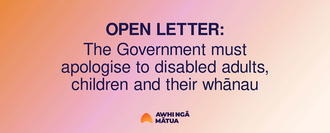
.jpg)

.png)
